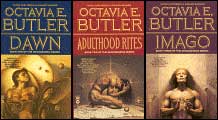Xenogenesis Trilogy - Octavia E. Butler
 Octavia Butler passed away earlier this year. I had previously read both Parable novels and Kindred. Those novels carry elements of SF, but are largely works of social literature, rather than genre fiction. After hearing of Butler's untimely death, I decided to try her Xenogenesis trilogy: Dawn, Adulthood Rites, and Imago – which are essentially science fiction in ways that many of her other books are not. I found the series to be less of a trilogy, and more of a set of variations on a theme. The first book, Dawn, is the most fully developed novel of the three, and is the only book in the series that is essential genre reading.
Octavia Butler passed away earlier this year. I had previously read both Parable novels and Kindred. Those novels carry elements of SF, but are largely works of social literature, rather than genre fiction. After hearing of Butler's untimely death, I decided to try her Xenogenesis trilogy: Dawn, Adulthood Rites, and Imago – which are essentially science fiction in ways that many of her other books are not. I found the series to be less of a trilogy, and more of a set of variations on a theme. The first book, Dawn, is the most fully developed novel of the three, and is the only book in the series that is essential genre reading.The story of Xenogenesis concerns the fate of humanity after a cataclysmic war which has killed most of humanity and rendered the Earth uninhabitable in the long-term. At this point, an alien race, the Oankali, descend to Earth, harvest the surviving humans, and create a research program to study the social and biological makeup of the species. Over the course of the series, the Oankali are revealed to have a biological imperative to accumulate genetic diversity throughout the universe, incorporating the best ideas of any evolutionary path and discarding the flawed or diseased. In this way, the Oankali become a kind of meta-species representing universal life in all its variations.
By destroying themselves, humanity has forfeited its right to independent existence – although that right is portrayed in the series as a mere illusion. The Oankali will breed with the remaining humans and become something new, effectively ending humanity as we know it. The first book, Dawn, focuses on Lilith, a human woman chosen by the Oankali to act as liaison to humanity in the early stages of the alien program and to lead the new human-Oankali hybrids to their new homes on Earth. The later books deal with the experiences of her mixed-species children as they attempt to reconcile their feelings of identity with normal humans and their own mixed-species societies.
Dawn works largely because of the central identity of Lilith, as she shares our emotional base. She makes decisions we may disagree with, but we understand her reasons for them. She initially feels revulsion and anger toward these alien invaders, and as she begins to develop tolerance and a grudging admiration for them, we can experience it as well. The narrators of the later books are too fully un-human to sympathize with (and maybe that's the point,) and their adventures are merely elaborations of Lilith's own from the first book. She plays a minor role in these later books, and the loss of a human character as an emotional anchor constantly threatens to separate the reader from the narrative. Butler might have been better suited telling at least one story from the perspective of a human resister.
The biological and reproductive descriptions in the books are fascinating, but as Butler explores them in the sequels, she creates more questions than she can answer. The Oankali are tri-sexual, with each mating requiring a male, a female, and an ooloi, whose job it is to selectively construct the offspring from the male's and female's genetic contributions. Unfortunately, the Oankali are biochemically monogamous – although that word is not exactly accurate – and all matings are essentially heterosexual. The books never address issues of homosexuality or promiscuity, though her system could allow both and interesting variations. (Perhaps this was an editorial decision to keep the books from being too weird.) Moreover, mixed-species children are more essentially Oankali than human, lacking many characteristics that might have benefited the new species: humor, art, imagination.
Dawn creates a compelling picture of a human future, and while it may be uncomfortable or unpleasant in places, it is a profound and poignant read. The later books are neither as engaging or as informative, but they are readable and have their own small, moments of genius. Instead of Adulthood Rites or Imago, I would recommend other books of humanity's future, such as Arthur C. Clarke's classic, Childhood's End, or Patricia Anthony's Brother Termite. For similar themes about genetic manipulation and human-alien relations, Karen Traviss's Wess'har series is worthwhile, if long-winded. And of course, Butler's Parable novels explore many of the same social themes of human identity, manifest destiny, and religion, and both of them are highly recommended.

0 Comments:
Post a Comment
<< Home